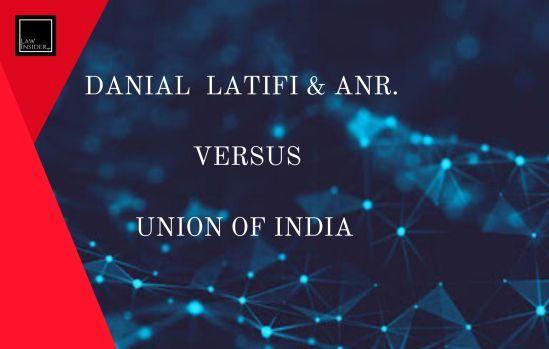Case Brief
Danial Latifi & Anr.
Versus
Union of India
Petitioner- Danial Latifi & Anr.
Respondent- Union of India
Statutes Referred-
- The Muslim Women (Protection of Rights on Divorce) Act, 1986 (the Act).
- The Code of Criminal Procedure, 1973.
- Indian Special Marriage Act, 1954.
- Indian Divorce Act, 1969.
Cases Referred-
- Mohd.Ahmed Khan v/s. Shah Bano Begum & Ors. (1985) 2 SCC 556.
- Bai Tahira v/s. Ali Hussain Fidaalli Chothia, (1979) 2 SCC 316.
- Fuzlunbi v/s. K. Khader Vali & Anr., (1980) 4 SCC 125.
- Aga Mahomed Jaffar Bindaneem v/s. Koolsom Bee Bee & Ors., 24 IA 196.
- Olga Tellis v/s. Bombay Municipal Corporation, 1985 (3) SCC 545.
- Maneka Gandhi v/s. Union of India, 1978 (1) SCC 248.
- Arab Ahemadhia Abdulla and etc v/s. Arab Bail Mohmuna Saiyadbhai & Ors. Etc, AIR 1988 (Guj.) 141.
- Ali v/s. Sufaira, (1988) 3 Crimes 147.
- K. Kunhashed Hazi v/s. Amena, 1995 Crl.L.J. 3371.
- K. Zunaideen v/s. Ameena Begum, (1998) II DMC 468.
- Karim Abdul Shaik v/s. Shenaz Karim Shaik, 2000 Cr.L.J. 3560.
- Jaitunbi Mubarak Shaikh v/s. Mubarak Fakhruddin Shaikh & Anr., 1999 (3) Mh.L.J. 694.
- Kaka v/s. Hasan Bano & Anr., 1998 II DMC 85.
- Umar Khan Bahamami v/s. Fathimnurisa 1990 Cr.L.J. 1364.
- Abdul Rashid v/s. Sultana Begum 1992 Cr.L.J. 76.
- Abdul Haq v/s. Yasima Talat 1998 Cr.L.J. 3433.
- Md. Marahim v/s. Raiza Begum 1993 (1) DMC 60.
Facts-
The judgement of the Shah Bano’s caused a turmoil in India and it became a national issue as well as political too , the parliament passed an act namely The Muslim Women (Protection of Rights on Divorce) Act, 1986 (the Act) , the enactment of the Act fulfilled various purposes with regards to the politics, Indian Constitution, Human Rights, Muslim Personal Law etc. On the basis of Shah Bano’s case the constitution validity of the Act was challenged by a petition.
Issue-
The legality of the act passed by the parliament whether it is constitutionally valid or not ?
Contentions of Parties-
Petitioner-
- Muslim marriage is a contract and an element of consideration is necessary by way of mahr or dower and absence of consideration will discharge the marriage.
- They contented that that as the Cr.P.C. is a part of Criminal Procedure and not civil law, the religion the religion professed by the spouses has no relevance in the scheme of these provisions. The basis there being, neglect by a person of sufficient means to maintain these and the inability of these persons to maintain themselves, these provisions have been made and the moral edict of the law and morality cannot be clubbed with religion.
- The section 125 of Cr.P.C. was enacted to prevent a situation where a divorced wife is likely to be led into destitution or vagrancy in the concept of social justice embodied in Article 21 of the constitution.
- The learned counsel for petitioner contented that the court will have to view the section 125 Cr.P.C. not on the basis of personal law but as a provision made in respect of women belonging to all religions
- That the act is unconstitutional, discriminatory and in violation of article 14 of the constitution.
Respondent-
- The respondent contended that it is clearly stated in the provisions that a reasonable and fair provision and maintenance to be made and paid by her former husband within the iddat period then the question whether it is for life or for the period of iddat would not arise.
- That the personal law is a legitimate basis for discrimination and therefore it does not offend Article 14 of the constitution.
- In Shah Bano’s case, it was held that divorced women is entitled to maintenance even after the in the iddat period from the husband, and that is how parliament also understood it.
- That the parliament enacted the Act respecting the personal law of muslims and that itself is a legitimate basis. A separate law for a separate community cannot be held discriminatory the Act aims to prevent the vagaries and not to make muslim women destitute and at the same time not to penalise the husband. The Act resolve all that while keeping the muslim personal law therefore the Act is not invalid or unconstitutional.
Judgement-
The Constitution Bench of the Apex Court consisting Justices G.B. Pattanaik, S. Rajendra Babu, D.P. Mohapatra, Doraiswamy Raju & Shivaraj V. Patil after hearing contentions of both parties and reading and analysing the Act and declared that the Act is not unconstitutional and it is valid.
Rule of Law-
That a divorced muslim women is entitled to fair and reasonable for her future being made by her former husband which must include maintenance for the future extending beyond the iddat period.
Comment-
The Bench elucidated what was in the act but the argument outside of the courtroom still continues because of the nature of the Act and how it impacts the society, the personal law and the other statute will be always standing face-to-face not side-to-side until a nexus is achieved.
Conclusion-
The Apex Court interpreted the Act in way that the very thing which parliament tried to undermine has solidified it while there are still various arguable point and conundrum which will addressed in coming time.

